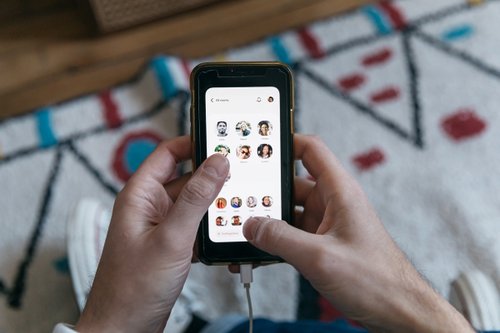Networking with social anxiety: 5 workers share their tips for dealing with it
19. 2. 2024
5 min.


Journalist and editor
No matter what you do for work, networking is probably an important skill you’ve had to learn over the years. Whether you have to attend work events throughout the year, or your business relies on word of mouth and client relations, networking can prove to be an invaluable part of your professional life. It allows you to make new connections with people in your field and can help you find new opportunities for career advancement.
However, it’s not always an easy task. For introverted people or workers with social anxiety, networking can be challenging and even draining. The added pressure of knowing that social interaction could have an impact on your career is quite intimidating for people who struggle with anxiety. Even something as simple as after-work drinks can cause a great deal of stress and nervous energy. Like most things in the world of work, networking is a skill that can be improved, and everyone has their way of making networking work for them. That’s why we heard from real workers on how they manage their social anxiety when it comes to networking.
Come prepared with talking points
“I do some background research on people before sending emails or meeting them in person. Knowing more about who the actual person is helps me plan conversation and see what topics could be common ground for discussion.” - Rebecca, Labor Relations Attorney
For many people with anxiety, fear of the unknown is one of the biggest triggers. Fear of the unknown is an aversion to ambiguous situations or unfamiliar scenarios. If you feel like you’re going into a social event with no context or you’re uncertain of the outcome, your mind can begin racing and some people can even experience panic attacks.
Rebecca’s tip is a great way to relieve some of the tension you may feel when meeting new people, especially if you think they may be able to influence your career in some way. If you often find yourself unsure of what to talk about or freezing up during conversations, prepping some talking points and looking for common interests can be a great way to make you feel more confident and prepared. With so much information readily available online, it should only take a few minutes to get a general sense of the person you’re going to meet. You can look at their LinkedIn or public social media profiles to learn a little more about them. Even a few superficial details can be enough to make you feel like you aren’t going in blind and you can relieve some of the pressure around meeting a new person.
Get comfortable setting boundaries
“I work on not feeling guilty for saying no or turning down invitations when I need to. It helps me relax and recharge between events.” - Connor, Process Development Engineer
Being able to set boundaries is an integral part of any healthy work-life balance, and sometimes saying no can be the right answer. While it may seem counterintuitive, declining a networking opportunity can be better than overextending yourself to the point where you could make a bad impression or start to burn out. If your company has an abundance of events and opportunities to network, you shouldn’t feel guilty turning down an invitation here and there. While it may feel like you’re missing out on something or not taking advantage of every opportunity, learning to say no will help you in the long run when it comes to safeguarding your mental health and maintaining a positive relationship with your work, so let’s all take a page out of Connor’s book on this one.
Use the buddy system
“If I’m in a group, I like to anchor myself to one person. It helps to have someone you can continue to check in with throughout an event.” - Maddie, News Anchor & Producer
Being in a group setting can pose a challenge for people with social anxiety, especially if you don’t know the people you’re with very well. As Maddie suggests, one simple way to combat this is to have a sort of “anchor” person to stay with throughout the event. Maybe you know your work bestie is going to be there or maybe at a large event you’re even welcome to bring a friend or partner with you. Sometimes simply knowing that you have someone to talk to can relieve all of the stress around feeling forced to make conversation and dreading awkward silences. If it’s a person you’re close with, they may even know the warning signs that you’re feeling anxious, or have their ways of helping you stay grounded during stressful events.
Take a step back
“When I start to feel overwhelmed at work events, I make an excuse to find a quiet place and have a few moments to myself. It can be as simple as standing in the bathroom or stepping outside for some fresh air, but just a minute away from the crowd can help you reset.” - Bronwen, Film Editor
If you do find yourself feeling overwhelmed at a networking event, it doesn’t mean you need to throw in the towel and head home. Sometimes all you need is a moment to yourself to decompress. For many people with anxiety, sensory overload is something you need to manage at events. Sensory overload occurs when your brain is taking in more sensory information than it can process, causing anxiety, irritability, and panic. This is often caused by things like loud music, multiple people talking at once, and crowds (all things you’re likely to encounter at networking events).
So, if you feel like the situation is becoming a bit much for you, all you have to do is step away for a moment. Finding a place where you can get away from the action for a few minutes can be all you need to reset. Scroll on your phone, take some deep breaths, or call a friend, anything that will ease your mind while you recollect yourself. Of course, it’s still important to know your boundaries and if you’re not feeling up to returning, it’s always okay to leave when you feel you’ve reached your limit.
Focus on the bigger picture
“For me, the best way to combat my anxiety is with treatment. When I’m able to meet with my therapist and have access to anxiety medication when needed it helps me in every aspect of my life, networking included.” - Phillip, Architect
While this piece of advice could seem obvious to some, many people still struggle with the stigma around mental health, especially when it comes to treatment. According to the World Health Organization, even though anxiety is one of the most common mental health conditions, affecting over 13 million Americans, only 1 out of 4 people suffering from anxiety seek treatment. Even though anxiety is a very common and manageable condition, one poll reporting on the stigma perceived by people with anxiety found that over half of them believe that most people view anxiety as a fake illness and a sign of weakness, and 48% felt that employers workers with anxiety would not be good employees.
So, Phillip’s advice touches on one of the most important aspects of managing social anxiety, both in networking and beyond. While all of this advice is helpful, many people require broader, holistic treatment to manage their anxiety, and creating a good support system and treatment plan can help you not only with networking but in all aspects of your professional and personal life.
Photo: Welcome to the Jungle
Follow Welcome to the Jungle on Facebook, LinkedIn, and Instagram, and subscribe to our newsletter to get our latest articles every week!

Další inspirace: Networking

Should I share my life on social media? Our personal branding expert weighs in
In our Insta-globalized age, broadcasting your life online can land you a dream job — or land you in trouble...
07. 9. 2023

How to get on the radar of people you admire
If you get yourself noticed by the right people and make a good impression, there’s a chance they will think of you when an opportunity opens up...
10. 3. 2022

Inside Clubhouse: the invite-only app changing the way we network
This invite-only networking app has social media buzzing. So how does it work- and how can it help your career?
24. 3. 2021

How real can we be on LinkedIn?
Photo dumps and live-streaming may encourage authenticity, but when it comes to professional networking, how much can we really share?
10. 12. 2020

Online networking: a life-saver for introverts
If interacting with people you don't know is not one of your strengths, you may find the idea of building your network daunting.
13. 10. 2020
Zpravodaj, který stojí za to
Chcete držet krok s nejnovějšími články? Dvakrát týdně můžete do své poštovní schránky dostávat zajímavé příběhy, nabídky na práce a další tipy.

Hledáte svou další pracovní příležitost?
Více než 200 000 kandidátů našlo práci s Welcome to the Jungle
Prozkoumat pracovní místa